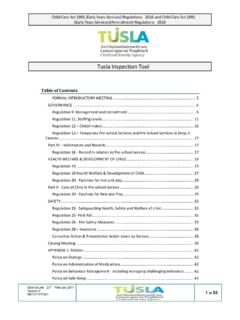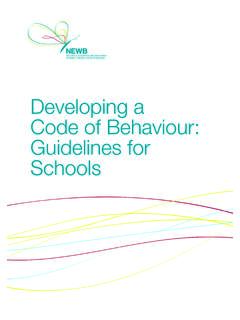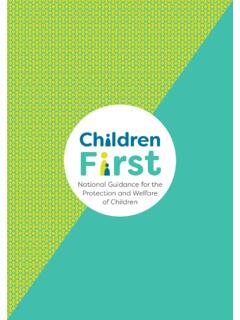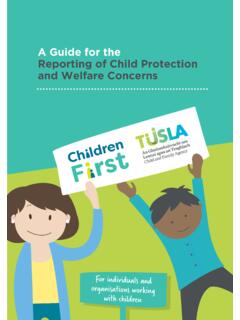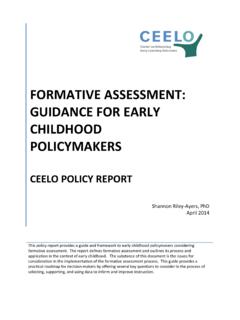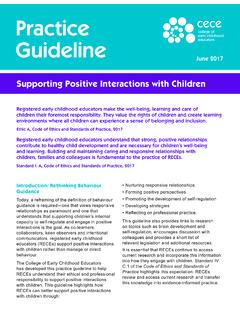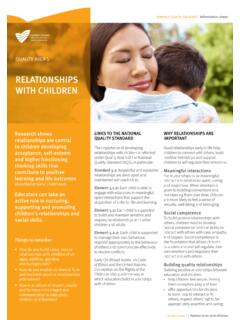Transcription of CONTEXT OF EARLY CHILDHOOD EDUCATION AND CARE …
1 1 CONTEXT OF EARLY CHILDHOOD EDUCATION AND care IN IRELAND In the last decade or so there have been many significant developments in the EARLY CHILDHOOD sector at local, national and European Commission levels. Preschool Regulations were first introduced in Ireland in 1996. These regulations were revised in 2006 and have now been further revised in the Child care Act 1991 ( EARLY Years Services) Regulations 2016 and the Child care Act 1991 ( EARLY Years Services) (Amendment) Regulations 2016. In 2018, Tusla s EARLY Years Inspectorate developed the Quality and Regulatory Framework (QRF), which sets out the core regulatory requirements for compliance with the EARLY Years Regulations 2016, The Quality and Regulatory Framework applies to all registered EARLY Years Services.
2 It sets out, in a clear way, the requirements for statutory compliance for providers of services, the stakeholders and parents/guardians to help them understand how the EARLY Years Regulations 2016 are interpreted in practice by the EARLY Years Inspectorate and how to comply with the Regulations. There have also been some very significant changes in Irish and international laws in relation to children s rights. The EARLY Years Regulations 2016 and these other legal changes, as well as other important developments, have made a significant impact on what providers of EARLY years care and EDUCATION services are required to do and wish to do, to meet higher standards of quality in developing and providing safer, more efficient and more effective services for children and families, and to ensure that children s rights are protected.
3 The developments and changes have also brought many and varied new supports to EARLY years providers and educators to help meet these requirements and expectations . The developments which impact on service provision for young children include: The development of S olta: The National Quality Framework for EARLY CHILDHOOD EDUCATION (CECDE, 2006) and the S olta Quality Assurance Programme (QAP). The introduction of Aistear: The EARLY CHILDHOOD Curriculum Framework (NCCA, 2009). Better Outcomes Brighter Futures: The National Policy Framework for Children & Young People 2014-2020 (DCYA, 2014). The establishment of Tusla, the Child and Family Agency (2014) and the subsequent nationalisation of the Tusla EARLY Years Inspectorate The development of the online Aistear S olta Practice Guide (NCCA, 2015), a quality practice resource which is directly accessible to all providers, educators and parents.
4 2 The introduction of the new EARLY Years EDUCATION Inspectorate (EYEI) at the Department of EDUCATION and Skills (2015). The creation of the national Better Start Quality Development Service (2015) and AIM the Access and Inclusion Model (2016). The National S olta Aistear Initiative (2016), which is guided and overseen by a steering group from the Department of EDUCATION and Skills (DES), the Department of Children and Youth Affairs (DCYA), the National Council for Curriculum and Assessment (NCCA) and Better Start. The coming into operation of the Child care Act 1991 ( EARLY Years Services) Regulations 2016 and the Child care Act 1991 ( EARLY Years Services) (Amendment) Regulations 2016 (DCYA, 2016).
5 The requirement under the EARLY Years Regulations 2016 for services to be registered with Tusla. The development of the Quality and Regulatory Framework (QRF) 2018 by the Tusla EARLY Years Inspectorate. We are awaiting the launch of the first national EARLY Years Strategy in development by DCYA. All of these positive developments have brought important new understandings, expectations and incentives for service providers to review, evaluate and update their operating processes, policies and procedures. They have also brought many valuable supports for services to inform their policy development and to enhance their practice in all areas.
6 It is important to note that all of these relatively recent developments keep the child at the centre of quality practice and recognise the significance of quality EARLY CHILDHOOD experiences. Awareness of all developments in the EARLY years sector is important when developing policies and procedures and all service policies should reflect all of the most up-to-date developments, knowledge and information. Supports for EARLY Years Service Providers Tusla and the Quality and Regulatory Framework Tusla, the Child and Family Agency was established on the 1st January 2014 and is the State agency responsible for improving well-being and outcomes for children.
7 The Agency operates under the Child and Family Agency Act 2013, a progressive piece of legislation with children at its heart, and families viewed as the foundation of a strong healthy community where children can flourish. 3 Partnership and co-operation in the delivery of seamless services to children and families are also central to the Act. ("About Us | Tusla - Child and Family Agency", 2018) Tusla is the regulatory agency responsible for inspecting preschools, play groups, cr ches, day- care and similar services which cater for children aged from birth to six years. On 4 May 2016, The Minister for Children and Youth Affairs published the Child care Act 1991 ( EARLY Years Services) Regulations 2016.
8 The EARLY Years Regulations provide for preschool services, that is, those services catering for children under the age of six years who are not attending primary school. The Child care Act 1991 ( EARLY Years Services) (Amendments) Regulations 2016 were published on the 20th December 2016. These Regulations are known as the EARLY Years Regulations 2016. Part 12 of The Child and Family Agency Act amends the Child care Act 1991 (as inserted by section 92 of The Child and Family Agency Act) known as Part VIIA, which sets out the supervision of EARLY Years Services including inspections and registration. Tusla National EARLY Years Inspectorate, is responsible for ensuring that EARLY years provision is delivered in accordance with the Child care Act 1991 ( EARLY Years Services) Regulations 2016 and the Child care Act 1991 ( EARLY Years Services) (Amendment) Regulations 2016.
9 Tusla is also responsible for the registration system of EARLY years service providers, which commenced in 2016. It is a legal requirement for all EARLY years services proposing to operate, to make application under section 58D(2) of The Child and Family Agency Act 2013, at least three months before they intend to commence operation (except in the case of a Temporary EARLY years service, in which case at least 21 days notice must be given). A registered provider must operate in accordance with the statutory requirements of the State as set down in the EARLY Years Regulations 2016 and Part 12 of the Child and Family Agency Act 2013 (Article 58 G).
10 Providers have a right of reply to any non-compliance to the regulations identified on inspection and to registration decisions. One of the requirements for registration is to ensure that the policies, procedures and statements of the service specified in Schedule 5 of the EARLY Years Regulations 2016 are in place. For more information see 4 City/County Childcare Committees (CCCs) and Voluntary Childcare Organisations (VCOs) City and County Childcare Committees (CCCs) are funded by the Department of Children and Youth Affairs (DCYA) and act as local agents for the DCYA in the administration of aspects of national EARLY years EDUCATION and care programmes.
